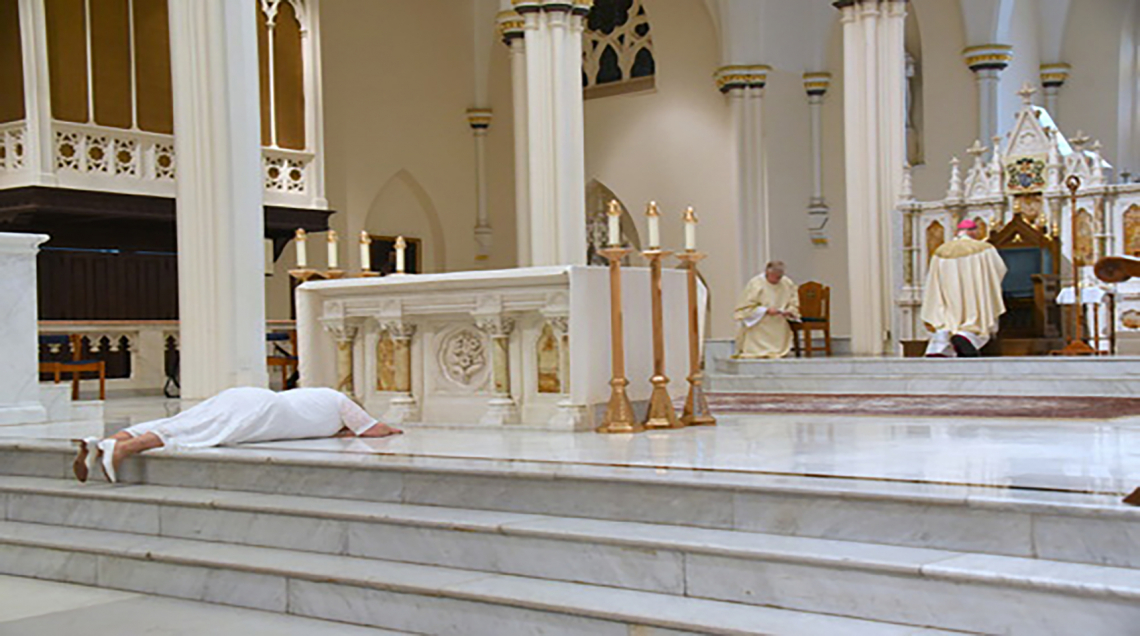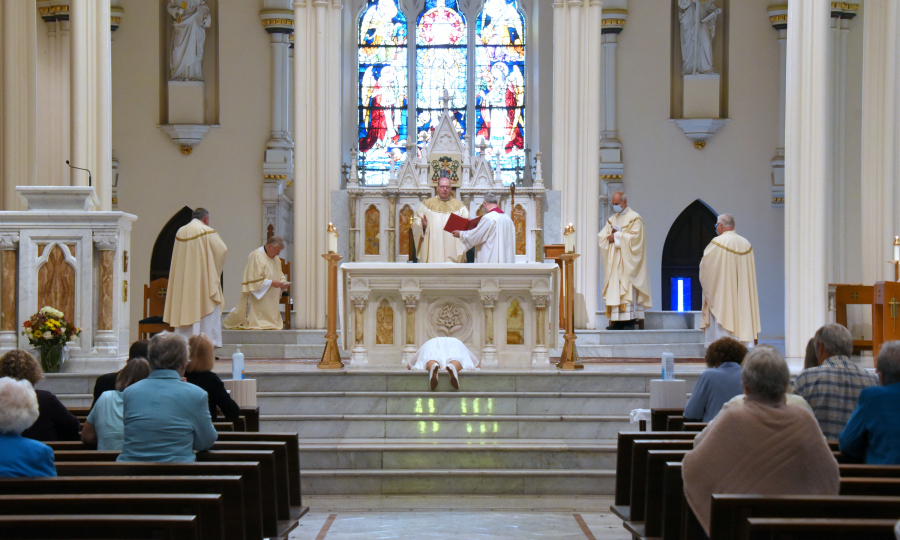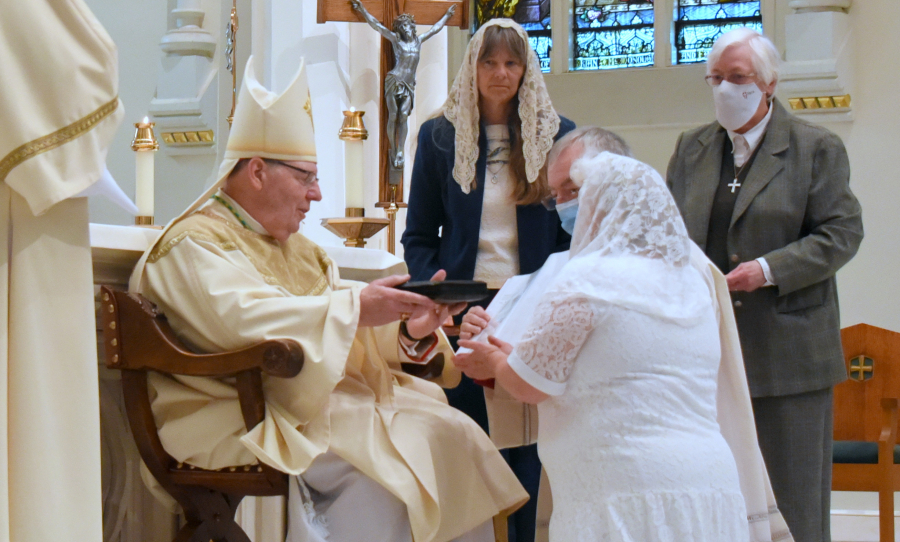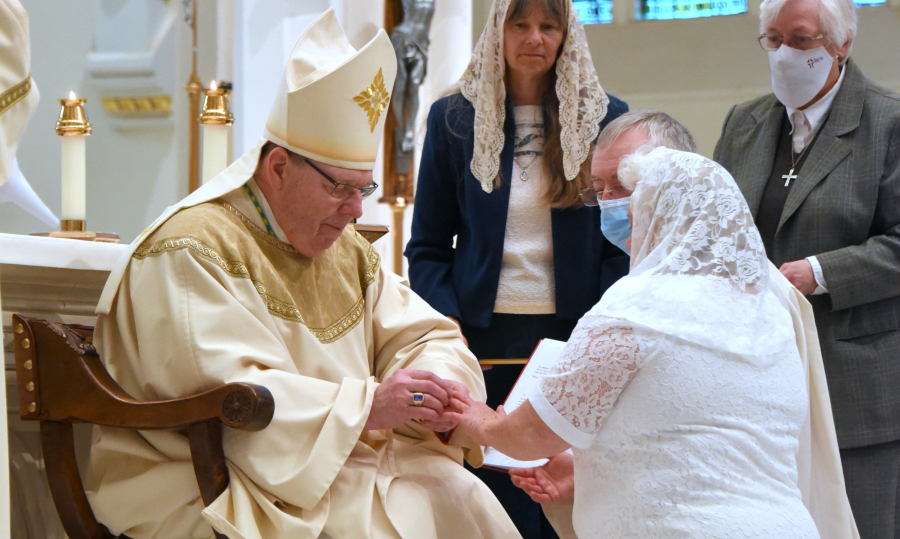“I’ve always felt drawn to God.”

Drawn to God since she was a young girl, Angela McCormick has now dedicated her life to His service and to the service of the Church as a consecrated virgin.
“This is a calling from God on my heart,” she says. “I want to be a witness of Christ’s love for the Church as His bride.”
Bishop Robert Deeley presided over the Rite of Consecration of a Virgin for McCormick on September 11 at the Cathedral of the Immaculate Conception in Portland, calling it a blessing for the Church in Maine.
“By what we do today in this rite, by our prayer together and our acceptance of her intentions, Angela will be irrevocably consecrated to God, while living in the world. She will be spiritually espoused to Christ and dedicated to the service of the Church,” the bishop said.
During the rite, McCormick stood before the bishop and resolved to persevere throughout her life in a holy state of virginity in the service of Christ and his Church, to follow Christ in the spirit of the Gospel, and to accept solemn consecration as a bride of the Lord. She then lie prostrate while the Litany of Saints was sung, after which the bishop offered the Prayer of Consecration, asking God to give her modesty with right judgment, kindness with true wisdom, gentleness with strength of character, freedom with the grace of chastity and the warmth of love, to love God above all others. The bishop then presented her with a veil and ring as insignia of her consecration and with a book of the Liturgy of the Hours, which she is to pray daily.
McCormick says the consecration has made her feel like a different person.
“I feel like I’ve moved from a close relationship with Christ to a spousal relationship with Christ. The intimacy has deepened quite a bit in my heart,” she says. “I feel set apart. There is a sacredness about the whole ceremony that is beautiful.”
The Rite of Consecration of a Virgin is one of the oldest sacramentals in the Church. In fact, legend has it that St. Matthew the Apostle consecrated the first virgin. Prevalent in the early Church, the rite declined in popularity with the rise of religious orders, and by the 10th century, it was used only sparingly by some monasteries. It would take 1,000 years for the rite to make a comeback. In 1970, following Vatican II, Pope Paul VI approved a revised Rite of Consecrated Virginity for nuns and for women like McCormick who commit their lives to Christ but still live independently in the world.
“The consecration is all about witness of being. So, it’s strengthening and deepening my walk, which is going to keep occurring all the way through eternity,” she says.
While McCormick describes the entire rite as amazing, she says what she found most moving was receiving the Eucharist for the first time after being consecrated.
“It was beautiful, even more so than usual, much more so,” she says. “That is Christ’s most loving gift to us. The most intimate act that we can have with Christ is to take Him, His whole body and soul, within ourselves.”
The closeness McCormick feels to Christ began to take root in her childhood. She grew up in Indiana where her family were active members of a Methodist church.
“God was always an important part of our family life. I can’t remember a time that God wasn’t first in my life. I just can’t. I’ve always felt drawn to God,” she says.
Her faith shaped who she was and how she acted. She remembers, for instance, being left out of some high school activities because of her commitment to stay true to her beliefs.
“It was refraining from participating in things that would not be glorifying to Christ, whether it was in words or actions, but also, it was professing my faith at appropriate times,” she says. “I would share my faith with my peers, not in a strong way, but I would talk about Christ and how He impacted my own life.”
When times were tough, it was Christ to whom she turned.
“I often received a lot of consolation when I went to God in prayer and through Scripture. I read a lot of Scripture,” she says.
Her faith didn’t wane during her college years, although she switched from attending a Methodist church to a nearby Presbyterian one. Intending to become a school guidance counselor, she received a degree in junior high education from Purdue University in Indiana but later decided to pursue counseling.
“In my 20’s, I decided I was going into being a counselor. I wanted to do it from a Christian worldview, and the advice I got was to get a seminary degree in counseling and religion. So, I got an M.A. from a reformed theological seminary, Westminster Theological Seminary in Philadelphia,” she says.
It was during this period that McCormick first started thinking about staying single so she could devote her life to God.
“Even though I was drawn to marriage at some point, I had a stronger desire to stay single and just be, ‘Lord, my life is completely yours, whatever you want to do with it,’” she says. “I started relating to Christ as my husband. I started seeing Him with that type of love for me. I started talking to Him every day in my heart, like I would to a husband. I started looking to Him for that type of relationship, that type of protection, and the parts of Scripture that meant the most to me were the ones centered around Christ calling the Church His bride. I saw that on the Church level but also on an individual level. That kind of grew, and I cultivated it.”
Although there was a time when she questioned whether the call she was feeling was real, she became convinced that it was.
“That intimacy was developing between me and God, and it was Christ initiating it, because He was giving me images in my heart. He was speaking to my heart in that way. It wasn’t me conjuring it up,” she says.
Discovering that she needed additional coursework to become licensed as a counselor, McCormick began pursuing a degree in clinical counseling at a Christian college in South Carolina, where she had moved to be with her parents. It was at that time that she started to explore the Catholic faith, sensing that something was missing at the Presbyterian church she was attending. She had been introduced to Catholicism years earlier when one of her brothers entered the Church after marrying a woman who was Catholic.
“I would always go to Mass with them when I visited them, and I was always impressed with the Mass. I felt drawn to it. Even though I didn’t understand the Catholic faith, I felt drawn to the Eucharist, and I was always disappointed when I couldn’t go up and receive the Eucharist. I was also really drawn to the reverence that people showed towards the Eucharist,” she says.
She also felt a pull towards the sacrament of reconciliation and to the teachings and spirituality of Pope John Paul II.
“I felt drawn to Pope John Paul II, just to his love for people and his love for God and his commitment to Scripture and to the Church. It seemed that he was very solid in my opinion, and he drew a lot of young people in,” she says.
She began attending Mass, tentatively at first, and fell in love with it. It led her to participate in the Rite of Christian Initiation of Adults.
“The priest there realized that I was really hungry for knowledge, so we went through the catechism together. I went through the entire catechism. I studied it all. He had me read some encyclicals, and we discussed them because I had a lot of questions,” she says.
Despite her questions, which included understanding Mary’s role in the Church, she says once she came to believe in the true presence of Christ in the Eucharist, there was no turning back. She entered the Catholic Church in October 2006.
The pursuit of a doctorate took McCormick to George Fox University in Oregon because it had a program that integrated Christianity with psychology. She began attending daily Mass and joining nuns at a nearby Benedictine Monastery for prayer.
“I went, and I just loved the Liturgy of the Hours. I said this really fits who I am -- praying through the day and then interspersing work with it,” she says. “It was the first time I really had any experience with nuns, so I spent a lot of time praying with them, and I started discerning whether I was called to a religious order.”
After a faith-enriching, pre-doctoral internship at a Catholic social service agency in Nebraska, McCormick decided to discern with the Sisters of Mercy in Maine, choosing an order here because it is where her Catholic brother and sister-in-law lived. She discerned with the sisters for nine months before deciding it wasn’t for her.
“I learned a lot from them about service, about helping those in need, but I also realized that it wasn’t the deep prayer life I was seeking,” she says.
She decided a monastic community might be a better fit, and after working at a post-doctorate rural consortium in Minnesota, which primarily included Indian Health Services, she entered St. Benedict’s Monastery in that state. She says she loved the balance of work and prayer but, as an introvert, had trouble adapting to community life.
“I was always looking for ways to be alone because I needed alone time with God. A lot of times, people need community around them to strengthen their faith, but I need alone time,” she says.
The unexpected death of one of her brothers also made her realize that she didn’t want to be away from family members, none of whom lived in Minnesota.
“That made a big impact on me because I was like, ‘Do I want to spend the rest of my life not being able to see my nieces and nephews?’” she says.
She had learned about consecrated virginity during her studies at the monastery and came to believe that was where God was calling her.
“I was like, ‘Wow, this is the way God made me. This is who I am. This fits what I have been called to all my life,’” she says.
McCormick left the monastery after three and a half years and returned to Maine to discern her vocation, settling in a home next to her brother and sister-in-law.
“It’s a place where I am able to have time alone with God in prayer. I continue the Liturgy of the Hours, praying every day, praying for the Church, praying for the priests, especially the priests of Maine,” she says.
While prayer is central to her life, it is something she must balance with her work as a psychologist since she must still earn a living. She views her career as a ministry.
“With my clients, even if I can’t talk with them about God, because they may not be Christians, I can pray for them the entire time I am with them. I try to look at every person as someone to whom I can spiritually be a mother,” she says. “I try to model Mary’s attitude and love, and I often look to her. I want to respond like her.”
Although she lives in the southern part of the state, her job regularly takes her to Aroostook County where she does evaluations of schoolchildren who are having difficulties. While the drive is a long one, she says it gives her extra time to be alone with God. She says as she is driving, she keeps in mind the spiritual needs of those around her.
“I will pray for the people who are driving really fast on the road or those who are on my tail,” she says. “I will pray for the people in the homes that I pass. It’s kind of like creating a conscious awareness of prayer for everyone.”
She also prays for those who have died or will die that day.
“I think a lot of people die unprepared spiritually, and my heart goes out to them,” she says. “I just ask for God to give them the greatest extent of mercy at that time when they’re meeting with Him.”
Even during the rite of consecration when others were praying for her, she says she was praying for them.
McCormick says the changes she sees herself since being consecrated will take her time to more deeply understand, but she says she now looks at others with more patience, compassion, and love. She says she is looking forward to a fuller sharing of her life with Christ, her heavenly spouse, and to bringing His love to others.
“It’s deepening that marital relationship with Christ, that walk with Christ in love, of experiencing God’s love, so that I can love others more authentically and less selfishly,” she says. “I can’t love that way unless I understand God’s love for me and experience that daily in my own life, so that’s what I’m looking forward to: a deepening of that relationship of love. It’s all about that love relationship. If you experience the love of God, and understand it, and it consumes you, you can’t help but love other people in the same way.”













